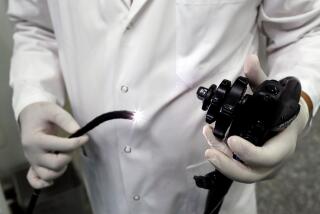Screening for ovarian cancer doesn’t reduce tumors or deaths, researchers say
- Share via
Screening for ovarian cancer does not reduce the risk of dying from the disease but does increase the likelihood of unnecessary invasive procedures, researchers said Saturday. “We were unable to detect ovarian cancers any earlier than in the women who did not get the screening,” and nearly 6% of the women tested had false positives, Dr. Christine D. Berg, chief of the early-detection branch at the National Cancer Institute told a Chicago meeting of the American Society of Clinical Oncology. The results also were published online in the Journal of the American Medical Assn.
About 21,880 American women are diagnosed with ovarian cancer each year, according to the American Cancer Society, and about 13,850 die from it. Because it produces few symptoms, the disease is typically not diagnosed until it has become advanced and spread throughout the body. As a result, five-year survival is only about 30%, and the disease is one of the five most deadly cancers among women. Being able to detect the cancer at an earlier stage when it might be more curable could thus, theoretically, improve the survival rate.
The tests most commonly used to detect ovarian cancer include a transvaginal ultrasound to look for tumor masses and a blood test that screens for increased levels of a tumor marker called CA 125.
A team led by Dr. Saundra S. Buys of the University of Utah studied 78,216 women, ages 55 to 74, who participated in the National Cancer Institute’s Prostate, Lung, Colorectal and Ovarian Cancer Screening Trial. Half of the women received the usual care from their OB-gyns, and half received a CA 125 screening every year for six years and an ultrasound every year for four years. They were then followed for a maximum of 12 years.
The researchers observed 212 ovarian cancers in the screened group and 176 in the normal care group. There were 118 ovarian cancer deaths in the screened group and 100 in the normal care group. The differences were not statistically significant. Overall, there were 2,924 deaths from all causes in the screened group and 2,914 in the normal care group.
But the researchers also observed that 3,285 women had false-positive diagnoses from the screening. Among those, 1,080 underwent surgery that included an oophorectomy [surgical removal of one or both ovaries]. Fifteen percent of those who had surgery developed major complications as a result. Overall, 1,771 women in the screened group (7.7%) had an oophorectomy, compared with 1,304 in the normal care group (5.8%).
“We conclude that annual screening for ovarian cancer ... does not reduce disease-specific mortality in women at average risk for ovarian cancer but does increase invasive medical procedures and associated harms,” the team wrote.
New data presented at the meeting also showed that the widely used cancer drug Avastin can improve treatment of ovarian cancer.





